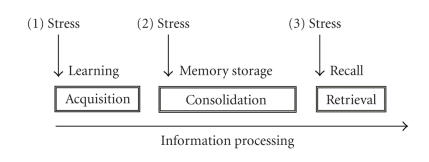Figure 1.
Diagram depicting the relevance of specifying timing of stress with regards to different memory phases. If stress (1) is given before learning (acquisition of information), it can potentially affect all cognitive phases involved in memory function; that is, acquisition, consolidation, and/or retrieval. However, if acquisition is already affected, that would be the main conclusion to extract from the particular experiment. If stress (2) is experienced after learning, any effect observed in retention could now be due to an impact of stress on either consolidation or retrieval, but any effects on acquisition can be discarded. However, effective treatments given at this time point normally disrupt the process of memory storage, instead of retrieval, which can be further tested by given the treatment at later time points (at a different—or outside the—consolidation phase) and assess whether recall is then also affected. If stress (3) is delivered before the recall test, it should just normally affect the retrieval processes. However, a note of caution should be mentioned depending on how close the retention test is applied with regards to training, since consolidation mechanisms are increasingly recognized to last longer than previously hypothesized and, therefore, this type of manipulation could influence both consolidation and retrieval processes. Research on this field should take into account this complexity and apply the necessary controls to ascertain which phase and mechanisms of the information processing is affected by the stress procedure under study.

